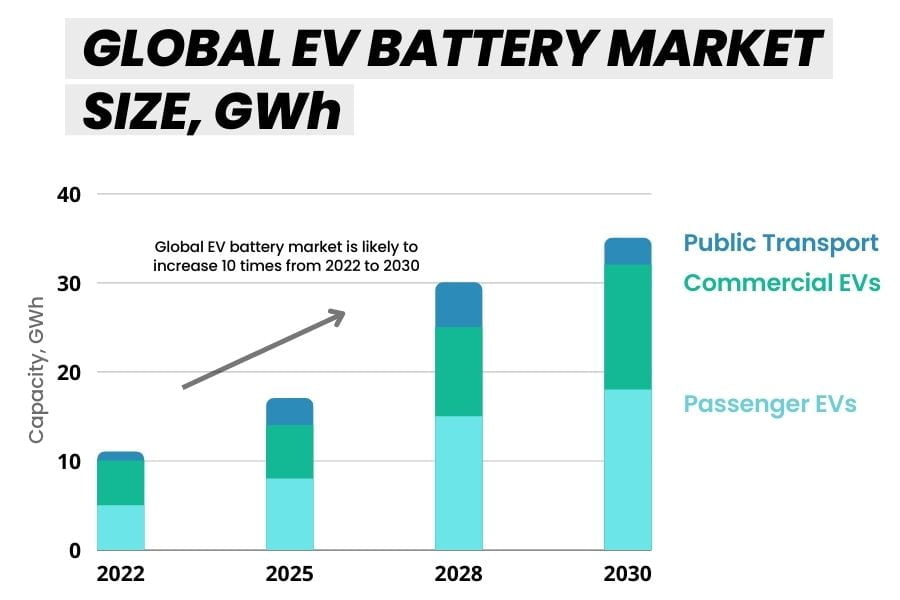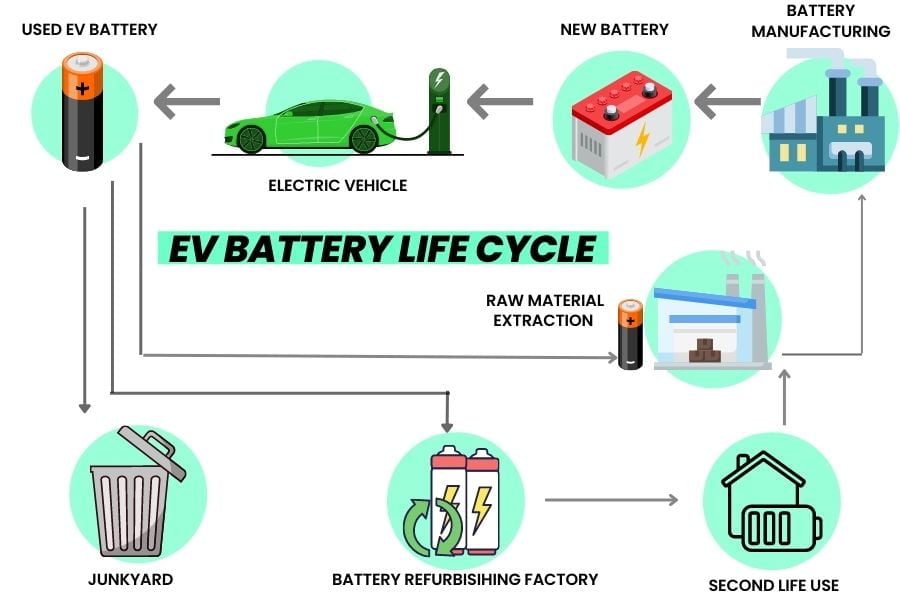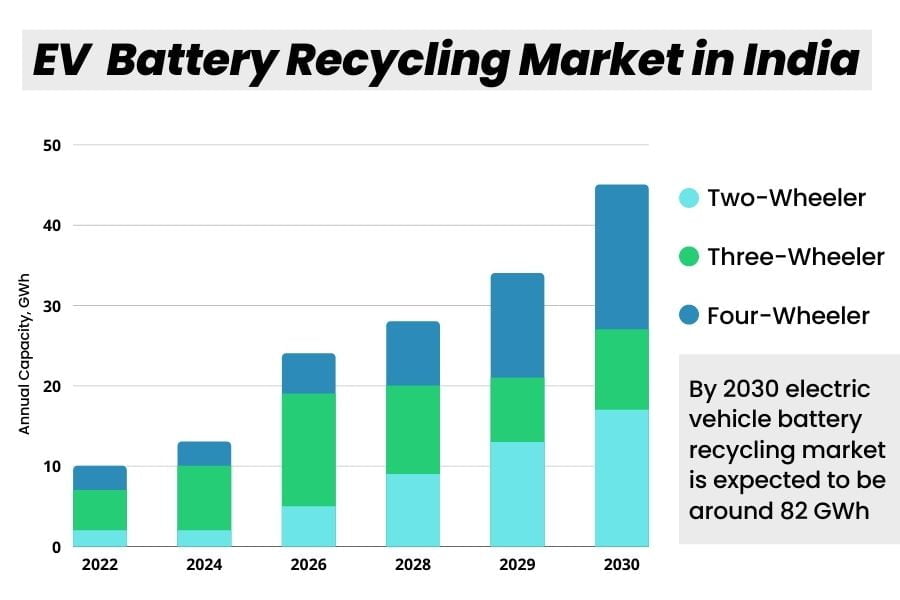The current growth of EVs is likely to create a dumpsite of discarded EV batteries in India, if not recycled properly. EV battery recycling in India is likely to be a $1,000 million industry by 2030.
Undoubtedly, an EV battery is a major component in an Electric Vehicle, as it stores energy to power the vehicle and related features. Currently, EVs are powered by Lithium-Ion batteries and Lead-Acid batteries, Li-Ion dominates the segment.
At the basic Level EV batteries consists of hundreds of cells packed together to form a large battery pack that goes into the chassis of the car.
Being in the nascent stage of EV adoption, a few percentage of EV batteries have approached their life cycles in India. But the current rate of EV adoption is likely to create a dumpsite of EV discarded EV batteries in India, If not recycled properly.
EV Batteries in India
| Battery | Use |
|---|---|
| Lithium-Ion battery | With a high energy density of 250-693 Wh/L, most used EV batteries |
| Lead-Acid Batteries | Low life-cycle, still in use in some Indian EVs: 3W, 2W |
EV battery market in India

As the GOI focuses on achieving 30% of vehicles on the Indian road to be Electric by 2030 with the help of supportive GOI policies and subsidies, so the estimated battery requirement is would be 158GWh annually which is likely to create a huge investment opportunity of USD 17 billion in the EV battery manufacturing segment, if manufactured indigenously.
Due to the lack of Local manufacturers in India, most Indian automakers currently import the Lithium-Ion EV batteries from South Korea and China.
Lithium-ion batteries consist of five major elements, aluminum, copper, cobalt, iron, and lithium, these five key elements contribute to the 50-60 percent of the cost of lithium-ion batteries, therefore any shift in these metal prices also directly affects the overall cost of the battery.
EV battery recycling
The battery contains some toxic chemicals, and the disposal of these batteries will cause several environmental issues, thereby causing water and soil pollution.
Battery recycling is the reuse and recycling of batteries with the goal of reducing the number of disposed of EV batteries and waste materials related to them.
In the process of recycling, the EV batteries are recycled to retrieve important materials as much as possible and preserve them for future use.
READ MORE:
Why EV battery recycling is necessary?
Depending on the size, a lithium-ion battery has a capacity of more than 500-10,000 charge and discharge cycles. At the end of the battery’s life cycle, if these batteries are not disposed of properly, in near future India will become a lithium-ion battery dumpsite.
Major reasons to recycle EV batteries are:
- Cobalt, lithium, and copper are some of the major elements used in EV batteries, these materials are mostly found outside India, therefore recycling these valuable elements from a used battery would cost down the import of these materials.
- If EV batteries are not disposed of properly, hazardous chemicals could leak from the EV battery, which would contaminate land and water nearby, contaminating our food chain, and causing an environmental hazard.
Currently, the recycling of EV batteries is quite less compared to the number of batteries manufactured globally. Only 5% of lithium-ion batteries are recycled all over the world.
Managing Dead EV Battery Waste

Second Life Use
The lithium-ion batteries used in EVs have a life span of fewer than 10 years. Batteries won’t provide the claimed range after 5-8 years of use, which indeed is frustrating. Therefore these batteries can be used as energy backup, that can hold up to 70%–80% of its initial capacity.
The second life use can be a sustainable and environment-friendly option since we can reduce waste and make maximum use of discarded EV batteries.
Closed-loop process
In a closed-loop process, the valuable materials used in the EV batteries are extracted. It is done via mechanical process, with the help of heat and flame, or with liquid and flames.
The valuable components like cobalt, lithium, copper, graphite, nickel, aluminum, and manganese contribute to 90% of the total cost of lithium-ion batteries. Therefore, the extraction of these valuable materials can cut down the cost of EV batteries.
Challenges in EV battery recycling
- According to reports by the JMK research, the minimum cost of recycling a lithium-ion battery is about Rs. 90-100 per Kg. Clearly, the cost involved in recycling Lithium-Iob batteries is slightly on the higher side.
- The collection, transport, and storage of discarded EV batteries is a major barrier for the EV battery recycling industry.
- Because of emerging battery technology, EV batteries have different compositions, features, and structural designs, therefore it is difficult to create a structured recycling system.
- Recycling EV batteries is a major constraint as huge investment is required to set up the battery recycling industry in India.
Electric Vehicle battery recycling market in India
Considering the current trend of electric vehicles in India, the growth of the EV battery recycling market is expected to boom from the year 2022, at a time when the first variant of EV batteries would complete their lifespan.

Going by the trend, the EV battery recycling industry in India is likely to be a $1,000 million industry by 2030, with expected demand growth of over 22-23 GWh EV battery recycling in India.
By 2030, the EV battery recycling market is likely to be injected with millions of discarded EV batteries a year, out of which 75% will be contributed by batteries from public transport vehicles, as they are prone to be discarded due to extreme charging-discharging rates and operating temperatures.
Because of the hike in the prices of fuel, people are globally moving towards the adoption of Electric vehicles. The growing number of EVs is directly proportional to the number of batteries for recycling.
The growth of EV battery recycling market can be expected to grow in India from the US $ 0.81 billion to the US $ 10 billion at a 20 percent CAGR between 2022-and 2030.
EV battery recycling companies in India.
Trying to grab a bite of the opportunity, some major automobile players have initiated the process of EV battery recycling in India. Here are some of the major EV battery recycling companies in India:
Attero Recycling
Attero Recycling is a key player among the EV battery recycling companies involved in the battery recycling market in India for more than 1 year. They have a commercial EV battery recycling plant in Noida, Uttar Pradesh.
Tata Chemicals
Mumbai-based battery recycling company plans to recycle 500 tons of spent lithium-ion batteries that are used in EVs. Tata Chemicals is involved with the lithium-ion battery recycling market for more than 1 year.
Raasi solar
The Banglore-based company Raasi solar is planning to set up a lithium-ion battery recycling plant. Additionally, the company also plans to manufacture cell and battery assembling.
Mahindra Electric
With the help of a supply partner, Mahindra Electric is also planning to emerge in the market of EV battery recycling segment. The EV battery recycling company in India is planning to recycle the EV batteries just like the process of recycling cell phone batteries.
Ecogears Take:
Having a limited life cycle, these EV batteries will run out of life eventually, therefore an effective process is needed to recycle them. A structured electric vehicle recycling system will prevent the nation from becoming a dumpsite of discarded EV batteries in the future.
GOI and manufacturers need to devise a strategy for scaling and automating the EV battery recycling process in India.
FAQ
Yes EV batteries can be recycled properly to extract the raw elements and reuse them to manufacture affordable electric vehicle batteries.
EV batteries are recycled in two ways, either by extraction of important raw elements like cobalt, Lithium for manufacturing new batteries, or by a second life process to resuse the discarded EV batteries to power houses.
EV batteries can be recycled either by extracting the raw elements for reuse, or by giving it a second life to power houses and other amenities.
Some of the major EV battery recycling companies in India are Attero recycling, Tata Chemicals, and Rassi Solar.
According to a report published by ecogears, the minimum cost to recycle Lithium-Ion EV batteries is Rs 90-100 per Kg.
The EV battery recycling industry in India is likely to be a $1,000 million industry by 2030, with expected demand growth of over 22-23 GWh EV battery recycling in India.
- Tata Motors unveiled Avinya EV Electric Car in India: Price, Range, Features - February 28, 2024
- India’s First Micro Electric Car: PMV EaS-E Price, Range, Features - February 28, 2024
- Best Tesla Wireless Phone Chargers for Model 3 and Model Y in 2023 –Buying Guide - October 7, 2023
